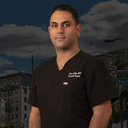Severe Diastasis Recti - What is the best treatment? Mesh? Ventral Hernia? (photos)
I have a severe diastasis recti after having 2 C-sections. The doctors think I have an unidentified connective tissue disorder which played a role in my stomach stretching so much. Does this look like a ventral hernia? The doctors don't seem to think I have a hernia, but I'm not so sure. Is this something I should try to submit to insurance? Is mesh recommended? Attached is my before baby picture and me now so you can see the drastic difference. Thanks for your help!





